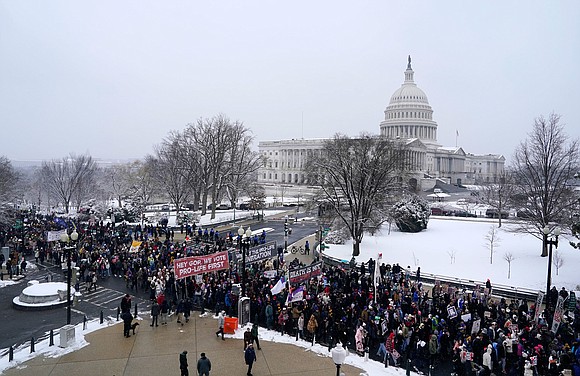Anti-abortion advocates look to state legislatures at second post-Roe March for Life
CNN/Stylemagazine.com Newswire | 1/19/2024, 8:06 p.m.

Originally Published: 19 JAN 24 18:14 ET
By Kaanita Iyer, CNN
(CNN) — Anti-abortion advocates gathered in Washington, DC, on Friday for the annual March for Life — the second since the Supreme Court overturned federal abortion protections.
Attendees who convened on the National Mall on a cold, snowy day said with Roe v. Wade overturned, they’re now looking to states to pass abortion bans. At least 14 Republican-majority states have banned the procedure with little to no exceptions, and seven others have limited access.
“What’s next is the state level,” said Blake Miller, member of a pro-life group at North Carolina State University. “We want to take it to the states, have pro-life marches at the states and hopefully get our state legislators to get a ban on abortion up to conception.”
Friday’s national march — the theme of which was “Pro-life: With Every Woman, For Every Child” — precedes marches scheduled in the coming weeks in more than a dozen states, including in Arizona, Georgia, Indiana, Kentucky and North Dakota, where abortion bans are already in effect.
Jim Hogan, who traveled to Washington from Pennsylvania for the march, stressed that “we have to continue to march and to help persuade people.”
“Fifty years of making it okay to abort, I don’t expect in a year everyone’s mind to change,” said Hogan.
This year’s march followed the new route set by the 2023 march, ending at the US Capitol instead of the Supreme Court “to symbolize that the battle post-Roe has shifted to the legislature,” one of the organizers then told CNN.
The march followed a rally where House Speaker Mike Johnson addressed the crowd. In his remarks, Johnson said that he is “a product of unplanned pregnancy” and is “very profoundly grateful” that his parents “chose life.”
“See what we have to do right now, and I believe the reason all of you are here is you understand that we have to build a culture that encourages and assists more and more people to make that same decision,” Johnson added.
2024 takes center stage at the march
Participants in the march were keenly aware that 2024 is a presidential election year, and reproductive rights are expected to be a key factor for many voters. Several attendees said candidates’ stances on abortion will be an important factor in their vote.
Florida Gov. Ron DeSantis and former South Carolina Gov. Nikki Haley have said they support state bans with some exceptions. Former President Donald Trump, the front-runner for the Republican nomination, has tried to walk a fine line on the issue while still touting his appointment of three conservative Supreme Court justices who played a part in overturning Roe v. Wade.
Democrats, on the other hand, are hoping that the issue will boost voter turnout and give their party an advantage for President Joe Biden’s reelection bid and states that will have abortion on the ballot in November. Abortion rights groups are looking to expand Ohio’s success in enshrining reproductive rights in its state constitution to several other states, including Arizona, Florida, Nevada and Maryland.
Ethan Abernathy — an 18-year-old undecided voter from St. Louis who intends to vote in November’s election — said pro-life issues are “really important” to him as he considers which candidate to support.
“Everybody has the right to life and that’s one of the things in the Constitution like right to life, liberty and pursuit of happiness,” Abernathy said. “If we don’t have the first right to life, we don’t really have anything past that.”
Anna Phillips, who is part of the Student for Life club at St. Louis University, said while she’s leaning toward Trump, his stance on abortion is “the only thing I’m iffy about.”
Trump has indicated that five- or six-week abortion bans are too aggressive and said at a town hall in Iowa earlier this month that he supports exceptions for rape, incest and life endangerment. But he added that the issue isn’t a political winner, saying, “You have to win elections.”
But some attendees said they were confident Trump will enact anti-abortion policies regardless of what he says on the matter.
“I think Mr. Trump is a realist in that there is a segment of our country that doesn’t believe that there should be limits on it and I believe that he believes that it should also be a last resort,” said Dawn Hogan of Pennsylvania, a crisis pregnancy center volunteer who plans to vote for Trump.
Hogan’s husband, Jim, who is also supporting Trump, acknowledged that “the way he messages things aren’t always the most ideal.”
“But like I’ve heard lots of previous Republicans talk, talk, talk, talk, talk — nice, beautiful stuff. They didn’t do anything,” Jim Hogan said. “Trump put three constitutional judges in place and helped overturn Roe vs. Wade. … He’s already walked the walk.”
CNN’s Veronica Stracqualarsi and Kristen Holmes contributed to this report.
The-CNN-Wire








